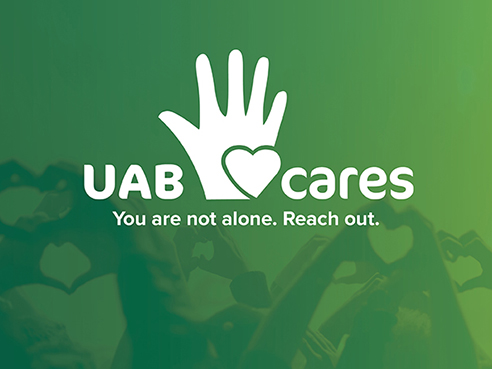 What happens when nearly 30 professionals from across the UAB enterprise team up to make a difference? A comprehensive 15-point plan aimed at preventing suicide on campus is one considerable result. A network of prominently displayed signage and murals designed to reach people in a moment of struggle is another — and both are part of the UAB Cares Suicide Prevention Initiative, launched in summer 2020.
What happens when nearly 30 professionals from across the UAB enterprise team up to make a difference? A comprehensive 15-point plan aimed at preventing suicide on campus is one considerable result. A network of prominently displayed signage and murals designed to reach people in a moment of struggle is another — and both are part of the UAB Cares Suicide Prevention Initiative, launched in summer 2020.
Signage was installed beginning in June on campus parking decks, footbridges, rooftops and other places that have a high potential for suicide attempts, as established by a safety scan of UAB’s physical campus conducted by the Suicide Prevention Leadership and Implementation Team, or SPLIT. The idea grew from highlighting UAB Cares in high-risk locations to displaying it prominently elsewhere on campus, ensuring any Blazer who needs help knows where to find it.
“We want to be a service to anyone on our campus who is in need, whether you’re a campus or clinical employee, an undergraduate, graduate or professional student, or a postdoctoral fellow,” said Angela Stowe, director of Student Counseling Services and a SPLIT member. “I’m so proud that UAB has invested such significant resources in suicide prevention, and UAB Cares is the result of hard work over a years-long period.”
The signs in high-risk locations currently are located in 13 parking decks, parking lots and key buildings across campus, with placement funding by the UAB Employee Assistance and Counseling Center, Parking and Transportation, Graduate Student Government, and the 2020 Alabama Higher Education Suicide Prevention Program Grant from the Alabama Department of Public Health, awarded to UAB Student Counseling Services.
Use this map to find the UAB Cares signage nearest you.
More about UAB Cares
Built by a taskforce of administrators, faculty, staff, and undergraduate and graduate students, UAB Cares aims to support and assist the entire UAB community — no matter who they are — in finding the help they need and ensuring they know they are important and matter. It includes resources for suicide education, prevention, intervention, response, follow-up and postvention.
|
“We want to be a service to anyone on our campus who is in need, whether you’re a campus or clinical employee, an undergraduate, graduate or professional student, or a postdoctoral fellow.” |
The taskforce underwent a yearlong systematic process that included reviewing evidence-based suicide-prevention approaches, identifying a theoretical model to guide recommendations, benchmarking against other institutions, conducting a deep audit of existing programs and services for students at UAB, identifying gaps and opportunities, and conducting a needs assessment of undergraduate, graduate and professional students about their perceptions of mental health support of UAB as well as their needs, Stowe says.
“I am grateful that our senior leadership has placed suicide prevention in such a high priority — ensuring everyone on our campus knows their lives are important and resources are available,” she continued.
More mental health resources
QPR Suicide Prevention Trainings
Learn how to identify warning signs of suicide, notice risk factors, and utilize the Question, Persuade and Refer method for suicide prevention during virtual training sessions.
Upcoming trainings:
- Through the EACC: 3:30 p.m. Oct. 11, and 8:30 a.m. Dec. 7
- Through the Center for Teaching and Learning: 1 p.m. Oct. 14, and 1 p.m. Nov. 9
- For students: 3 p.m. Oct. 7, and noon Oct. 27
B Well UAB Mental Health App
An app created by Blazers, B Well UAB helps students and employees easily access resources on mobile devices and build a self-care plan that encourages healthy habits. Learn more online.
Employee Assistance and Counseling Center
The EACC offers no-cost, confidential support services for employees and members of their immediate household via a team of certified counselors, an extensive collection of online resources, and a busy schedule of programs and events. Learn more online.
Student Counseling Services
SCS supports students in achieving personal, academic and lifelong goals through individual and group mental health services, prevention and outreach programming, crisis and emergency support, and consultation services, both in-person and virtual. Learn more online.
Togetherall
Students can use Togetherall to connect to college and university students day and night all over the world for peer-to-peer chat and mental health support. Learn more online.
Kognito
Students can use the Kognito app to practice difficult conversations with students in an online simulation, and employees can use it to learn when to have conversations with students they are concerned about, what to say and how to connect them to appropriate resources. Learn more online.
Visit the UAB Cares website at uab.edu/uabcares to find a one-stop shop for mental health resources.
